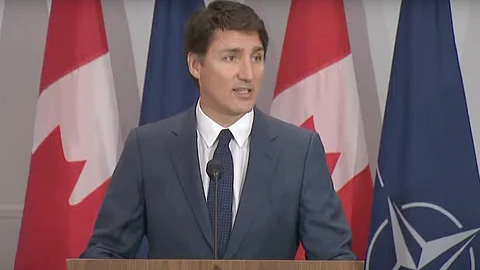

Prime Minister Justin Trudeau is vowing a “strong and calibrated” response to President Donald Trump’s threats of 25% tariffs on Canadian steel and aluminum, warning the measures would harm American jobs and cause economic pain on both sides of the border.
Trudeau’s comments came amid rising tensions over three potential U.S. tariff hikes targeting Canada, including levies as high as 50% on steel and aluminum, due to the combined 25% tariff on all Canadian goods plus the 25% steel and aluminum tariff.
Trudeau stressed Canada’s push to point out the risks to U.S. workers, after a brief exchange with Vice-President J.D. Vance.
“I highlighted the $2.2 billion worth of steel and aluminum exports from Canada that go directly into the Ohio economy, often contributing to manufacturing there,” said Trudeau during a press conference in Brussels.
“He [Vance] nodded and noted it. But it wasn’t a longer exchange than that.”
The interaction reflects a broader “Team Canada” strategy, Trudeau said, with premiers, ministers, and officials consistently reminding U.S. counterparts of the two countries economic ties.
Trudeau pointed out that the 2018 tariffs under Trump that cost the U.S. 75,000 jobs despite being lower than those now proposed.
“This isn’t mere speculation. We know job losses will happen,” said Trudeau.
The White House is weighing three separate tariff threats.
A 25% across-the-board tariff plus 10% on energy over fentanyl concerns, despite Canada supplying just 1% of fentanyl in the U.S.
A 25% levy on steel and aluminum, and the potential April 1 tariffs tied to a disputed U.S. trade deficit.
Trudeau called the fentanyl-linked tariffs “misplaced,” emphasizing Canada’s efforts to curb the crisis.
On steel and aluminum, Trudeau warned new tariffs would repeat past mistakes.
“These policies undermine U.S. economic growth,” said Trudeau, adding Canada would “respond appropriately” to any tariffs.
Asked about Trump’s suggestion of 50% tariffs, Trudeau said Canada’s retaliation would match the scale but stressed confrontation isn’t his goal.
“We don’t want a trade dispute,” said Trudeau.
“The best thing for North America is to work together on challenges like our economies, energy security, and critical minerals.”
Trudeau acknowledged the tariffs could strain relations but framed Canada’s position as necessary to protect jobs and sovereignty.
“If we have to pause partnerships to stand up for Canadians, we will. It’s not our choice, but we’ll do it,” said Trudeau.
Trudeau urged a focus on shared goals, like countering authoritarian regimes and boosting Western democracies competitiveness.
“At a time when we should be uniting, these tariffs risk dividing us,” said Trudeau.
Despite the threats, Trudeau expressed hope for future cooperation.
“After this difficult period, we’ll resume partnerships good for both countries,” said Trudeau.
For now, Trudeau’s message remains clear, the tariffs will backfire and hurt both countries.
“We’ll keep showing U.S. leaders how interconnected we are,” said Trudeau.
“Hurting Canada means hurting Americans too.”
